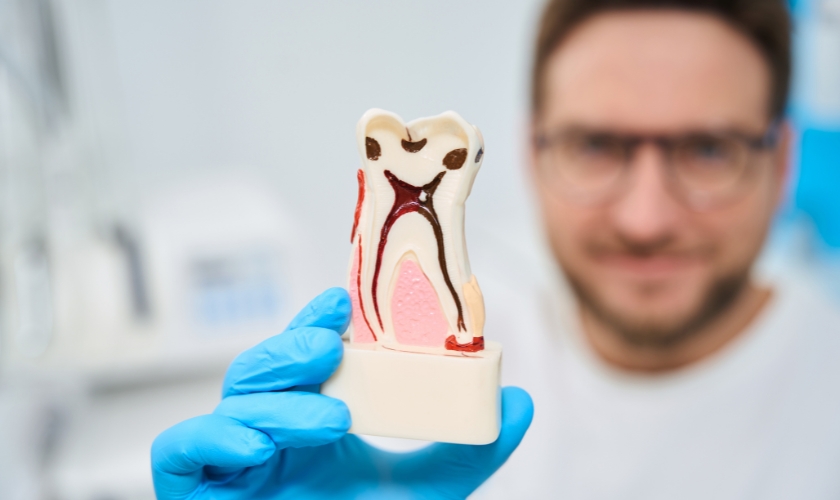Evening Hour Appointments For New Patients!

If you care about your teeth, catching problems early really matters. Take root canals, for example. They’re one of the most common ways dentists save a damaged tooth. But what if you drag your feet and put off the treatment? Delaying a root canal isn’t just risky—it can end up costing you a lot more, and the problems won’t stop at just one tooth. Your whole mouth and, honestly, your health in general, can take a hit if you wait too long. So let’s talk about why it’s better to deal with this sooner rather than later.
What’s a root canal?
It’s a dental procedure where your dentist removes infected tissue from inside your tooth. Usually, bacteria sneak in through a deep cavity, crack, or chip, and once the inner pulp gets infected, it hurts – a lot. And if you leave it alone, things can spiral out of control.
Root canals sound scary, but they’re a foolproof treatment to save your tooth. If you put off treatment, though, you’re opening the door to a whole lot of problems. Here’s what can happen if you wait:
1. More Pain, More Trouble
The first warning sign you’ll probably notice is a nagging toothache. At first, it might not seem like a big deal—just a little pain here and there. But as the infection spreads, the pain gets worse. It can turn sharp, throbbing, and flare up when you chew or put pressure on the tooth.
2. The Infection Spreads
Ignore that infected tooth long enough, and the bacteria don’t just stay put. They spread into the tissue around your tooth, sometimes even into the jawbone or beyond. At that point, fixing the problem becomes much harder. You might end up needing even more dental work or losing the tooth completely if you delay the root canal anymore.
3. Losing the Tooth
This one’s simple: wait too long, and your dentist might not be able to save the tooth. Extraction could be the only option left, which means you’ll have a gap in your smile and will need to consider more extensive (and expensive) fixes like implants or bridges.
4. Abscesses
An untreated root infection can lead to an abscess—a pocket of pus that forms around the tooth. These are painful, can make your face swell, and sometimes even cause a fever. If you still don’t get it checked, the infection can keep spreading, leading to even bigger health concerns.
5. Higher Costs Down the Road
The longer you hold off, the more complicated and expensive the fix becomes. The infection weakens your tooth, meaning you might need a crown or even an extraction. Acting fast means less damage, less work, and lower bills.
And it’s not just your mouth that’s at risk. Dental infections can mess with your overall health. They can trigger gum disease, and in some cases, even raise your risk of health issues like heart problems or make diabetes more complicated to manage. Good oral health isn’t just about your teeth—it’s about your whole body.
So how do you know if you need a root canal?
Watch out for these signs:
- Persistent, sharp tooth pain
- Sensitivity to hot or cold
- Swollen or tender gums
- Tooth discoloration
- A pimple-like bump on your gums near a sore tooth
If you notice any of these, don’t just wait it out. Book a visit with your dentist right away. The sooner you get it checked, the better off you’ll be.
Worried about the procedure itself?
Don’t be. Thanks to local anesthetics, root canals are usually simple and painless. Your dentist cleans out the infection, seals up the tooth, and you’re good to go. Maybe you’ll feel a bit sore for a couple of days, but it’s nothing you can’t handle with regular pain meds.
Dragging your feet on a root canal only leads to more pain, bigger problems, and higher costs. Taking care of it early means you save your tooth and keep your mouth (and body) healthier in the long run. If you’re noticing symptoms or just have that gut feeling something’s wrong, don’t put it off. Schedule a visit with your dentist, like the team at Camarillo Premier Dental, and keep your smile healthy.
FAQs
- How do I know if I need a root canal?
If you’re experiencing severe tooth pain, sensitivity, or swelling in your gums, you might need a root canal. Consult your dentist for an evaluation. - What happens if I ignore the need for a root canal?
Ignoring a needed root canal can lead to tooth loss, infection spread, abscess formation, and higher treatment costs. - Is a root canal painful?
Most patients experience minimal pain during a root canal procedure, as it is performed under local anesthesia. Any post-procedure discomfort is usually manageable with over-the-counter pain relievers. - How long does a root canal take to heal?
Most people experience some discomfort for a few days following the procedure, but recovery is generally quick, and most can return to normal activities within a few days.




